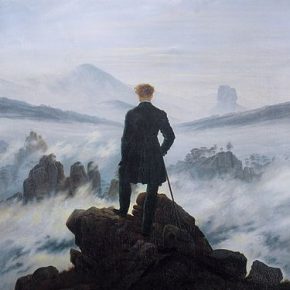Synchronized Chaos November 2016: Resilience in a Capricious Universe
Welcome, family and friends, to November’s issue of Synchronized Chaos Magazine. Sending honor and respect to the departed for those who celebrate Day of the Dead or Samhain, and prayers for abundance for those marking American Thanksgiving.
This month we acknowledge the unpredictable nature of our lives, and our world, and honor our ability to survive within it by toughening up or adapting to change.
Vijay Nair’s poetry shows us how friendship is not always true, as people can betray us. We can gain strength and learn from all experiences, and some lessons are best learned in solitude.
M. Spear’s poems form wry critiques of the ways we ignore and exploit each other and express personal determination to move forward as an individual.
Poetry from Michael Marrotti deals with learning to manage others’ self-absorbed behavior by recognizing it and distancing oneself.
Jenny Santellano gives a visual portrayal of depression and mania as a mental prison, trapping the speaker within the bars of fluctuating energy and moods.
Suvojit Banerjee offers up colorful imagery of poverty, violence, nuclear war, and slum life. The radiance and liveliness of Banerjee’s work contrasts with the shortened, limited existences of the people he mentions, highlighting the tragedies he depicts.
A short story from Michael Robinson, also set within a poor and rough neighborhood, illustrates how men and boys can also experience sexual confusion, feelings of lost innocence, and body shame.
Mahbub celebrates natural life and growth and human love, as we see through his gentle metaphor how these qualities persist through periods of loneliness and struggle.
Lewis Mark Grimes reviews Stephen Nawotniak’s children’s book Mubu the Morph, which encourages patience and tolerance by showing an anthropomorphized creature trying various activities and roles. Grimes, an admirer of children’s literature, sees this concept as a metaphor for sentient life in general.
Art from Rui Carvalho also plays with the idea of childhood, with an intricate black and white rendition of a fairy with a child’s face. Childhood is full of rapid change and events outside of the young person’s control, but also the capacity to adapt to new circumstances.
A poem from Christopher Bernard brings Dr. Seuss-like political humor to the American election landscape.
An essay from Donal Mahoney points out that plants we consider useless can be crucial for preserving life, such as the monarch butterflies who lay their eggs on the milkweed of Maplewood, Missouri.
Poetry from Mark Schwartz, replete with intellectual and literary references, depicts the author’s active mental life while his body is confined in a nursing home recovering from an injury. He advocates a kinder society where we nurture and take care of everyone, no matter how useful, or not, they may seem to those in charge.
Elizabeth Hughes reviews Rita D’Orazio’s novel Legend of the Coco Palms Resort, a tale of ghosts, memory, romance and suspense set on a Hawaiian vacation lodge, in her monthly Book Periscope column.
Joan Beebe showcases the intricate majesty of a wooden clock her husband carved. Time reminds us of the sorrows of impermanence and mortality, but can also be marked in style.
A short story from JD DeHart renders of the Biblical story of Job in a country farm town, from the point of view of Satan, the innocent man’s tormenter and accuser. In DeHart’s piece, the Devil inflicts great suffering out of curiosity and gives up out of boredom, reflecting a capricious universe.
Writing, creating art and communicating can be a means of resilience, of understanding and making something out of random or challenging circumstances. We thank you for reading the words of our contributors and allowing their stories to last and be heard.


There’s no beginning and there is no end
Just a life cycle that comes again and again
I’m getting into the habit of getting things done
I’m getting things done and I’m having some fun
Why do I go on and on and on
Is it because after the dark comes the dawn?